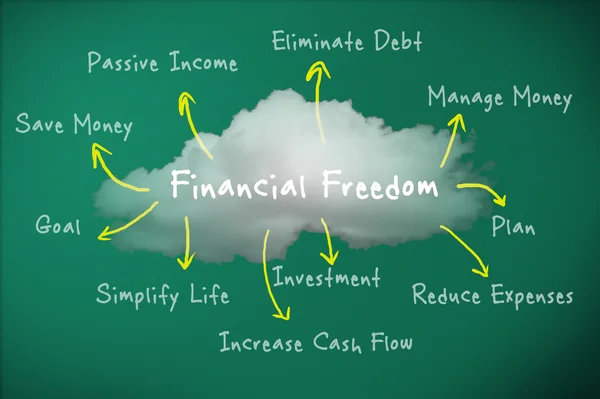Do you want to be financially successful in your 20s? Your financial success at retirement age starts today. Whether you are a student, entry employee or an entrepreneur, your investment skills today, will make a difference between a happy and sad life in your 60s.
In this post, learn the best 15 tips on successful financial planning for 20 year olds. It will help you in following finance skills; finance literacy, budgeting, savings, investments, wealth management and also how to get ahead financially in your 20s.
How do I get ahead financially in my 20s

The 20s are your defining decade. It’s the time to figure out your life blueprint, set a strong finance and career foundation as well as actualize your dreams. Here are my 4 tips on how you can easily get ahead in your 20s. The tips will help to deal with the common mistakes identified above.
Grow your Financial Knowledge
The twenties are the best time to grow your finance literacy and hone your money-handling skills. Read widely on the best personal finance books for the 20-year-olds. They include The Rich Dad Poor Dad, The Richest Man in Babylon, Think and Grow Rich as well as Transforming Your Relationship with Money. Besides books, identify great blogs, YouTube channels, and Podcasts sharing practical tips and experiences on money handling.
Related: Best Secrets on getting ahead financially in your 20s
Empowered with the right financial skills, you will find it easy to save money and grow your wealth. Practicing self-discipline, delayed gratification, and investment will become second nature. Remember to celebrate each achieved financial milestone as well as review and revise plans for more growth and success.
50-30-20 rule for practical Budgeting
Do you want to have a practical personal budget? Use the 50/30/20 budgeting principle. It will also make it funnier to track your finances. This principle entails dividing your income into three expenditure categories; 50% on your needs, 30% on your wants, and 20% on your savings.
A budget is not all about planning by listing how much goes to which expense. Accountability or tracking your spending is. For instance, if you have exhausted the money budgeted for entertainment, do not use the money for essential costs like food or rent to entertain yourself; otherwise, you might have to borrow unnecessarily.
There are a variety of online budgeting tools and apps that you can use. They include the zero-based budgeting app or free Excel budgeting templates.
Adopt a Healthy Spending Habit
Have you heard that your habits determine your destiny? In his book, “Atomic Habits,” James Clear says that people succeed based on the systems that they have set in place to work for them. If you want to make it financially, come up with tried money management strategies. It’s these habits that will make you accountable for your money, and avoid debts and wastage.
Some of the best financial planning habits for you are;
- Frugal living tips to save you a ton of money during the rising cost of living; Find any way to save on each expense. For instance, lower your food and grocery budget by using leftovers and buying food at farmers’ markets. How about cost-sharing on Netflix and internet subscriptions? Carpooling too can reduce your commuter and fuel bills
- Separate your essential spending for basic needs such as shelter, food, healthcare, work, and personal care. from discretionary or luxurious expenses like Netflix and magazine subscriptions
- Delayed gratification or One-month waiting period. Are you a spendthrift, or prone to unplanned impulse buying? A delaying strategy or delayed gratification, like a one-month waiting, may make you realize that owning the new iPhone series isn’t a matter of life and death, You can simply live without it. Or better, the prices may have gone down.
Start a side Hustle
At times, the secret of living a happy life is making more money and not just taming your “bad” spending habits. In addition to your 9-5, formal job, it’s time you launched your side hustle. Since you are still young and energetic, you can invest to improve your personal skills or pursue entrepreneurial opportunities.
Some ways you can make money as a stay-at-home mother include; taking private jobs, side gigs and freelancing. Besides, you can consult, or take advantage of the internet to make money online and lay the foundation for passive income generation opportunities. Your options are unlimited if you look deeper.
What are the worst financial mistakes to avoid in your 20s?

Your 20s is a season for many firsts. Apart from securing your first job, it’s likely to be the first time you live alone and make big financial decisions on your own. So how do you manage your “big” salary between supporting your parents and spoiling your siblings? Offset your bills, student loan and at the same time go for that overdue vacation? As a newbie in the world of money management, you are likely to make some mistakes. They may land you to recurrent bad debts for life.
Related; How to spend your money wisely
Here are the common financial mistakes to avoid in your 20s for financial independence today and in many years to come.
Not Having a Budget
Having a personal budget is MUST for managing your finances as a pro. Without one, you will overspend on stuff you do not need and surely fall into debts. Make sure you create a budget that includes all your cash income and expenses and stick to it faithfully.
Not Saving Enough
Saving money is not for everyone. It’s even harder when you are just starting life on your first job or business. However, it’s important to make savings for the amount of money that you can afford. Set a savings goal for emergency funds, planned investments like a car. Make savings a habit to contribute to grow your savings regularly.
Not Investing
Saving your money without investing it is counterproductive. It’s investments that grow your wealth over time. Consider investing in low-risk assets such as SACCO accounts, Money market or savings accounts to get started. You can hire a finance advisor to determine your risk tolerance and investment options that are right for you.
Impulse Shopping
Impulse buying in your 20-year-olds is a common financial mistake. It’s easy for someone to get caught up in a moment and buy items you do not need. It can be electronics, subscriptions or vacations that rarely improve your lifestyle. If there’s something you really want, give yourself time to think about it before making the purchase. You may find that you don’t really need it after all.
Not Tracking Your Spending
It’s easy to lose money when you do not track where you’re spending it. Track your expenses regularly on a simple budgeting app or a spreadsheet. This will help you identify areas where you may are overspending and can adjust it on your budget accordingly.
Taking Unnecessary Loans
Credit cards and mobile money borrowing are very convenient and easy to access. But they are very costly in the long run. Interest rates on credit cards, mshwari and fuliza loans are often high (up to 90% p.a) per month. It means living within your means and debt free is cheaper for you.
What Financial Goals should you have in your 20s?

As a 20-year-old, your financial goals may include; savings to buy a home, paying off your student loans, going back for further studies or buying your first car. However, the best finance you should prioritise at this stage of your life are three: build an emergency fund, minimise debts and Start saving for your retirement. Let’s look at each of them.
Plan for the Future
In this financial journey, everything you will hear will be about planning. In your twenties, you need to plan for your future. Do you intend to marry? When will that be? What will be the financial implication of the same? How much will be required for that? Are you planning to get kids? How many? How about their education? Do you intend to own a home?
Write these things down and the timelines. They might not happen when you have written them down, but it is better to have a plan than not to. You may need a financial advisor to help you with this. It will be worth it.
Build an Emergency Fund
It’s a financial cardinal sin to live without an emergency fund. An emergency fund is your savings account for a rainy day or any unexpected or unplanned expenses. These include medical emergencies, car repairs, or job loss. According to financial experts, you will need to set aside three to six months’ worth of your living expenses. If you are in self-employment and consulting types of business, have an emergency fund of eight months or one year. The money needs to be readily accessible for such unforeseen use.
While it may seem like a huge amount of money, there are some easy ways to get started.
- Set a goal for how much money you want to save
- Create a budget that will help you reach that financial goal.
- Look for ways to cut back on your expenses, such as by eating out less or cancelling subscription services you don’t use.
- Consider setting up automatic transfers from your checking account to your savings account each month, so you don’t have to think about it.
Build your credit score
It’s in your 20s that you build and improve your credit score. Start by making a list of all your debts. They may include credit card loans, Mobile money loans, and student loans such as HELB, A car loan or an education loan that you are currently servicing.
Include the principal balance and interest rates. Then, focus on paying off the debt with the highest interest rate first, while making minimum payments on the rest. Once you’ve paid off the highest-interest debt, move on to the next highest and so on. Consider using a debt payoff calculator to help you create a payoff plan that works for your budget.
Those actions will reflect on the factors that contribute to a higher credit score that include a history of on-time payments, low balances on your credit cards, a mix of different credit card and loan accounts, older credit accounts, and minimal inquiries for new credit.
Start Saving for Retirement
Even if retirement seems far off, it’s important to start saving as early as now. The earlier you start saving, the more time your money has to grow. Consider setting up a pension or retirement benefits commonly known as 401(k) or IRA and contributing as much as you can afford.
If your employer offers a pension or gratuity plan such as NSSF, take advantage of any matching contributions they offer. This is essentially free money that can help boost your retirement savings. If you don’t have access to a 401(k), consider setting up an IRA (Individual Retirement Account).
There are four types of retirement investment plans in Kenya you can invest in:
- Government sponsored plans; the national social security fund (NSSF)
- Employer sponsored plan; company organised for employees to prepare for their retirement
- Individual pension plans; offered by insurance companies and other financial institutions targeting self-employed and individual supplementing government and employer sponsored plans
- Personal retirement investment portfolio. You manage your own wealth to create enough war chest for your retirement.
Make a Budget and stick to it.
A budget is a spending plan based on your income and expenses. It’s more or less a roadmap of how you will make and spend your money. Someone said that if you do not show your money where to go, it will show you where to go, and you won’t love it..
To budget, write a plan of how much you spend on the basic needs such as Rent, Food, Transport, Savings, Internet, Tithe, Entertainment, Miscellaneous, etc Use the 50/30/20 budgeting principle to allocate cash. This principle entails dividing your income into three categories; 50% on your needs, 30% on your wants and 20% on your savings.
How to Invest in Your 20s?
Looking to build wealth in your 20s? But what are the best finance vehicles to invest your money in your 20s? The goal should be to grow your money and have it in highly liquid form. Here are your best options for you:
Savings accounts:
Use a high-yield savings account to build up your emergency fund and short-term savings goals. These can be with a commercial bank, SACCO or a money market.
Retirement/Pension accounts:
Take advantage of tax-advantaged retirement accounts like pension scheme, life assurance and personal pension plans to save for retirement.
Index Mutual funds:
Consider investing in low-cost index funds, which provide broad diversification and have historically performed well over the long-term. You can consider the equity funds, bond funds or a balanced fund for medium to long term finance goals. A money market fund is best for a finance goal in 12 months..
In conclusion, as a 20-year-old, there are several important finance goals to prioritize, including building an emergency fund, paying off high-interest debt, and saving for retirement. Avoid common pitfalls such as impulse shopping and not having a budget, and consider the best finance vehicles for your needs, such as high-yield savings accounts and index funds. By taking these steps, you can set a strong foundation for your financial future.




Quite an eye opener